英语中表示原因的几种方式
解释原因的英语句型

解释原因的英语句型摘要:1.引言2.解释原因的英语句型分类a.原因状语从句b.使用because引导的句子c.使用since引导的句子d.使用as引导的句子3.这些句型的使用场景和注意事项4.结论正文:【引言】在英语中,解释原因的句子非常重要,它们可以帮助我们更好地表达事件发生的缘由。
本文将介绍几种常见的解释原因的英语句型,并简要说明它们的使用场景和注意事项。
【解释原因的英语句型】1.原因状语从句:原因状语从句通常位于主句之前,用来说明主句动作发生的原因。
例如:- I didn"t go to the party yesterday because I was sick.(昨天我没去参加派对,因为我生病了。
)2.使用because引导的句子:because引导的句子可以直接说明原因。
例如:- She didn"t go to the party because she was sick.(她没去参加派对,因为她生病了。
)3.使用since引导的句子:since引导的句子表示自从某个时间点以来,某个现象一直存在。
例如:- I haven"t seen her since she went to Paris.(自从她去巴黎以来,我就没见过她。
)4.使用as引导的句子:as引导的句子表示两个动作同时发生,其中一个动作是另一个动作的原因。
例如:- She laughed as she saw the joke.(当她看到笑话时,她笑了。
)【使用场景和注意事项】1.在选择使用哪种句型时,要根据具体语境来判断。
例如,如果需要强调原因,可以使用because引导的句子;如果需要表示时间关系,可以使用since或as引导的句子。
2.避免重复使用同一种句型,以增加句子的多样性和可读性。
3.在使用原因状语从句时,要注意保持主从句之间的逻辑关系清晰。
4.在使用because引导的句子时,要注意避免使用过多的原因状语从句,以免使句子显得冗长。
because of的高级表达

"Because of" 是英语中常用的一个短语,用于表示原因或理由。
然而,在追求更高级或更复杂的表达时,我们可以选择使用其他词汇或结构来替代它。
以下是一些"because of" 的高级表达方式,它们可以在各种语境中丰富和提升你的语言技巧。
1.Owing to: 这个短语与"because of" 非常相似,但听起来更为正式和专业。
例如,你可以说"Owing to the bad weather, the flight was delayed."2.Due to: 这个短语也常用于正式场合,它强调了某个事件或情况是由于某种原因而发生的。
例如,"The project was delayed due to technical issues."3.As a result of: 这个短语不仅表示原因,还暗示了一个直接的后果或结果。
例如,"As a result of her hard work, she was promoted to manager."4.In consequence of: 这个短语更强调后果或影响,适用于描述某个事件或决策所带来的长期或重大影响。
例如,"In consequence of the accident, the company had to shut down for several months."5.Thanks to: 这个短语虽然听起来比较口语化,但它也可以用于正式场合,以表示感谢或认可某个原因或人。
例如,"Thanks to your help, we managed to finish the project on time."6.On account of: 这个短语较为正式,通常用于描述某个事件或行为是由于某种原因而发生的。
英语作文两点原因连接词

英语作文两点原因连接词连接词在英语作文中起到连接句子和段落的作用,使文章更加连贯和流畅。
以下是常用的连接词及其用法:1.因果关系(CauseandEffect):Because(因为):用于表达原因,放在句子开头或中间。
Dueto(由于):常用于正式场合,表示原因。
Asaresult(作为结果):用于引出结果。
Therefore(因此):表示因果关系,放在句子开头或中间。
2.对比关系(Comparison):However(然而):表示对比关系,连接两个相互矛盾的观点或情况。
Ontheotherhand(另一方面):用于引出相反的观点或情况。
Similarly(同样地):用于引出相似的观点或情况。
Incontrast(对比):用于引出两个相反的事物或观点。
3.递进关系(Progression):Furthermore(此外):用于引出进一步的观点或信息。
Moreover(而且):表示增加观点或信息。
Inaddition(另外):用于引出额外的观点或信息。
Additionally(此外):表示增加观点或信息。
4.强调关系(Emphasis):Indeed(确实):用于强调所说的内容是正确的或真实的。
Undoubtedly(无疑):表示毫无疑问地。
Obviously(明显地):表示显而易见。
Clearly(清楚地):表示清晰明了地。
5.让步关系(Concession):Although(虽然):用于引出一个与前面观点相反的情况。
Despite(尽管):表示尽管有某种情况存在,但不影响另一个事实。
However(然而):表示与前面的观点相反的情况。
Eventhough(即使):用于引出与前面观点相对立的情况。
这些连接词可以帮助你在英语作文中更好地表达不同的观点和关系,使文章更具逻辑性和连贯性。
不同的连接词适用于不同的情况,根据文章的需要灵活运用可以提升作文的质量。
英语中表示原因的几种方式
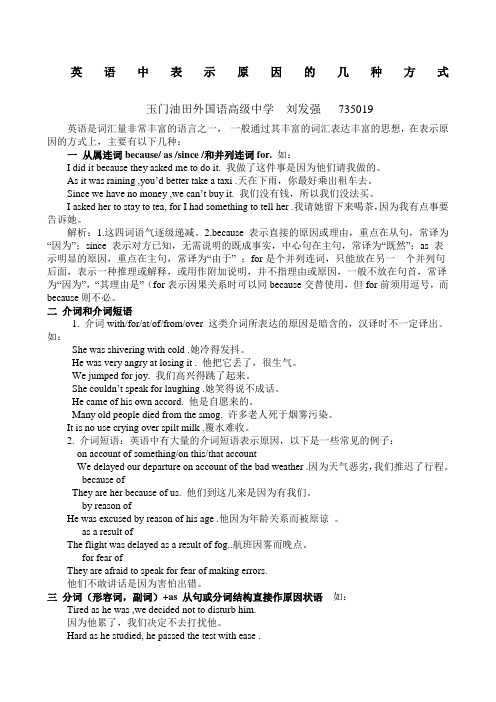
英语中表示原因的几种方式玉门油田外国语高级中学刘发强735019英语是词汇量非常丰富的语言之一,一般通过其丰富的词汇表达丰富的思想,在表示原因的方式上,主要有以下几种:一从属连词because/ as /since /和并列连词for.如:I did it because they asked me to do it. 我做了这件事是因为他们请我做的。
As it was raining ,you’d better take a taxi .天在下雨,你最好乘出租车去。
Since we have no money ,we can’t buy it. 我们没有钱,所以我们没法买。
I asked her to stay to tea, for I had something to tell her .我请她留下来喝茶,因为我有点事要告诉她。
解析:1.这四词语气逐级递减。
2.because 表示直接的原因或理由,重点在从句,常译为“因为”;since 表示对方已知,无需说明的既成事实,中心句在主句,常译为“既然”;as 表示明显的原因,重点在主句,常译为“由于”;for是个并列连词,只能放在另一个并列句后面,表示一种推理或解释,或用作附加说明,并不指理由或原因,一般不放在句首,常译为“因为”,“其理由是”(for表示因果关系时可以同because交替使用,但for前须用逗号,而because则不必。
二介词和介词短语1. 介词with/for/at/of/from/over 这类介词所表达的原因是暗含的,汉译时不一定译出。
如:She was shivering with cold .她冷得发抖。
He was very angry at losing it . 他把它丢了,很生气。
We jumped for joy. 我们高兴得跳了起来。
She couldn’t speak for laughing .她笑得说不成话。
中考英语专题复习:表示原因,目的的介词

表示目的的介词
(3) at多表示行为的目标或精力的集中点。 Look at the blackboard, please. 请看黑板。 He shot at the bird. 他向那只鸟射去。
1. It is reported that a lot of adults take lessons online __D____
表示目的的介词
2. 表示目的的介词for, to, at。 (1) for表示拟定的接收人或目的,跟在含有出发或开始意义的动词后, 如:leave, set out, start, depart, sail等。 I bought a gift for my little sister. 我给我的妹妹买了一份礼物。 They have left for Hong Kong. 他们动身去香港了。
---Yes. He died __A__ illness.
A. of
B. from
C. with
D. as
表示原因介词多,经常用的有六个。 褒贬奖惩要用for,through局部动全身。 受外因影响from,of原因出在内。 情感因素用with,at变化因见闻。 目的介词for, to, at,其中区别听我说。 for的目的是拟定,出发开始动词后。 to的目的很实际,前面动词方向性。 at目标很明确,集中精力快去做。
英语中原因表示法种种
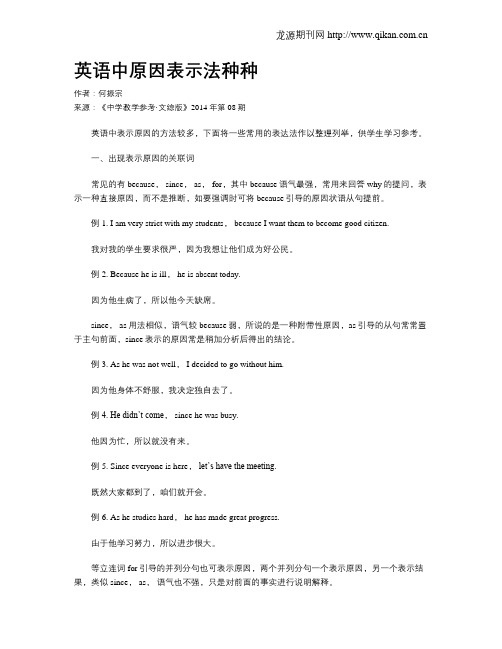
英语中原因表示法种种作者:何振宗来源:《中学教学参考·文综版》2014年第08期英语中表示原因的方法较多,下面将一些常用的表达法作以整理列举,供学生学习参考。
一、出现表示原因的关联词常见的有because, since, as, for,其中because语气最强,常用来回答why的提问,表示一种直接原因,而不是推断,如要强调时可将because引导的原因状语从句提前。
例1. I am very strict with my students, because I want them to become good citizen.我对我的学生要求很严,因为我想让他们成为好公民。
例2. Because he is ill, he is absent today.因为他生病了,所以他今天缺席。
since, as用法相似,语气较because弱,所说的是一种附带性原因,as引导的从句常常置于主句前面,since表示的原因常是稍加分析后得出的结论。
例3. As he was not well, I decided to go without him.因为他身体不舒服,我决定独自去了。
例4. He didn’t come, since he was busy.他因为忙,所以就没有来。
例5. Since everyone is here,let’s have the meeting.既然大家都到了,咱们就开会。
例6. As he studies hard, he has made great progress.由于他学习努力,所以进步很大。
等立连词for引导的并列分句也可表示原因,两个并列分句一个表示原因,另一个表示结果,类似since, as,语气也不强,只是对前面的事实进行说明解释。
例7. Gui lin is famous for its scenery.桂林以风景优美而著名。
例8. It’ll rain, for the swallow flies very low.天要下雨了,因为燕子飞得很低。
表示原因的英文高级表达

在英语中,有许多高级的表达方式来表示原因。
以下是一些常用的高级表达:1. Due to: 由于例如:The delay was due to bad weather.(延误是因为天气不好。
)2. Owing to: 由于例如:Owing to his hard work, he was promoted.(由于他的努力工作,他得到了晋升。
)3. As a result of: 由于...的结果例如:As a result of the heavy rain, the game was canceled.(由于大雨,比赛被取消了。
)4. Because of: 因为例如:She couldn't attend the meeting because of a family emergency.(她因为家庭紧急情况无法参加会议。
)5. In view of: 鉴于例如:In view of the recent budget cuts, we need to find ways to reduce expenses.(鉴于最近的预算削减,我们需要找到降低开支的方法。
)6. Thanks to: 多亏了例如:Thanks to your help, we were able to finish the project on time.(多亏了你的帮助,我们能够按时完成这个项目。
)7. On account of: 由于例如:The event was canceled on account of low ticket sales.(由于门票销售不佳,该活动被取消了。
)8. For the reason that: 因为例如:He was absent from work for the reason that he was sick.(他因为生病缺勤了工作。
)9. In light of: 鉴于例如:In light of recent developments, we have decided to change our strategy.(鉴于最近的发展,我们决定改变我们的策略。
英语原因状语从句

英语原因状语从句
英语中的原因状语从句用来表示件事情发生的原因或理由。
在原因状
语从句中,常常使用以下引导词:
1. because: 因为
2. since: 因为
3. as: 由于;因为
4. given that: 鉴于;由于
5. seeing that: 鉴于;由于
6. considering (that): 考虑到;鉴于
7. due to: 由于;因为
8. owing to: 由于;因为
例如:
- Since it's raining outside, we should bring umbrellas. (由
于外面在下雨,我们应该带雨伞。
- As he had already left, I couldn't give him the message. (由于他已经离开了,所以我不能给他传达消息。
)
- Given that it's late, we should go home now. (鉴于已经很晚,我们现在应该回家了。
)
- Considering the price, this car is a good deal. (考虑到这
个价格,这辆车是个不错的交易。
)
- Due to bad weather, the flight was cancelled. (由于恶劣的
天气,航班被取消了。
)
- Owing to his hard work, he was promoted. (由于他的努力工作,他得到了晋升。
…的原因英语高级表达
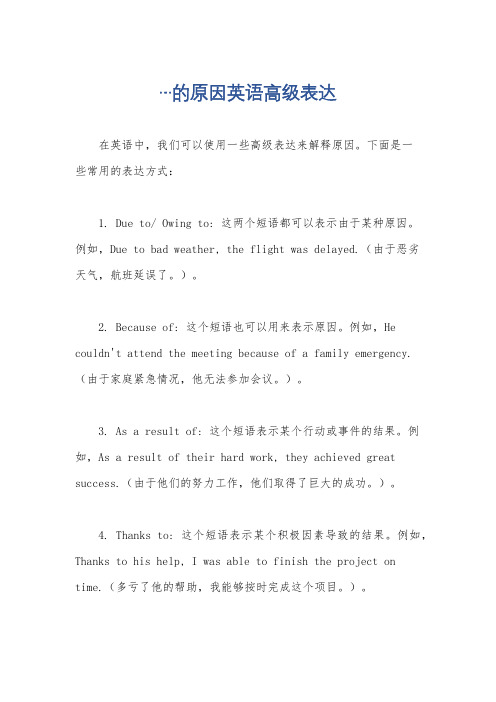
…的原因英语高级表达在英语中,我们可以使用一些高级表达来解释原因。
下面是一些常用的表达方式:1. Due to/ Owing to: 这两个短语都可以表示由于某种原因。
例如,Due to bad weather, the flight was delayed.(由于恶劣天气,航班延误了。
)。
2. Because of: 这个短语也可以用来表示原因。
例如,He couldn't attend the meeting because of a family emergency.(由于家庭紧急情况,他无法参加会议。
)。
3. As a result of: 这个短语表示某个行动或事件的结果。
例如,As a result of their hard work, they achieved great success.(由于他们的努力工作,他们取得了巨大的成功。
)。
4. Thanks to: 这个短语表示某个积极因素导致的结果。
例如,Thanks to his help, I was able to finish the project on time.(多亏了他的帮助,我能够按时完成这个项目。
)。
5. In view of: 这个短语表示基于某种考虑或观点。
例如,In view of recent events, we have decided to cancel the trip.(考虑到最近的事件,我们决定取消这次旅行。
)。
6. On account of: 这个短语表示出于某种原因。
例如,The game was postponed on account of heavy rain.(由于大雨,比赛被推迟了。
)。
7. For the reason that: 这个短语用来解释原因。
例如,He couldn't attend the party for the reason that he had to work late.(他不能参加派对,原因是他得工作到很晚。
中学英语中表示原因、理由的介词

中学英语中表示原因、理由的介词浙江省奉化中学吴亚翠介词是英语中最活跃的词类之一。
有人说英语是介词的语言,掌握好介词是学好英语的关键。
下面就表示某一动作或状态产生的原因、理由的介词作一总结、归纳。
1.for: 因为;由于某事物多用于表示内在的、心理的原因。
例如:He didn’t answer for fear of hurting her feelings.他没回答是怕伤她的感情。
I couldn’t speak for laughing.我笑得说不出话来。
They sang and danced for joy他们高兴得又唱又跳。
They will reward you for your help.你帮了他们,他们会奖赏你的。
常见的短语还有:praise sb for..因…而受到称赞; be sorry for.. 因…而表示歉意; be famous/well-known for.. 因…而闻名; pay for.. . 因…而付款;be punished for…因…而受到惩罚, excuse sb for .. . 因…而请求宽恕/饶恕,apologize to sb for…因…而道歉/认错,be honored for因…而受到尊敬2. at: 多用来表示感情上的原因,常和表示一定感情的词连用。
例如:I’m much pleased at your arrival.你来了我非常高兴He is angry at being delayed.他因被耽搁而生气。
People wondered at his skill,人们惊叹他的技艺。
常见的短语还有:be afraid at, be surprised at, be happy at, be frightened at, be sad at, be in deep sorrow at, at sight of etc.3.on/upon: (表示为某事物的基础、根据或理由)由于,因为所表示的原因与条件直接相关。
历年考研英语中常见的十五种“逻辑关系词(或称衔接词)”(1)
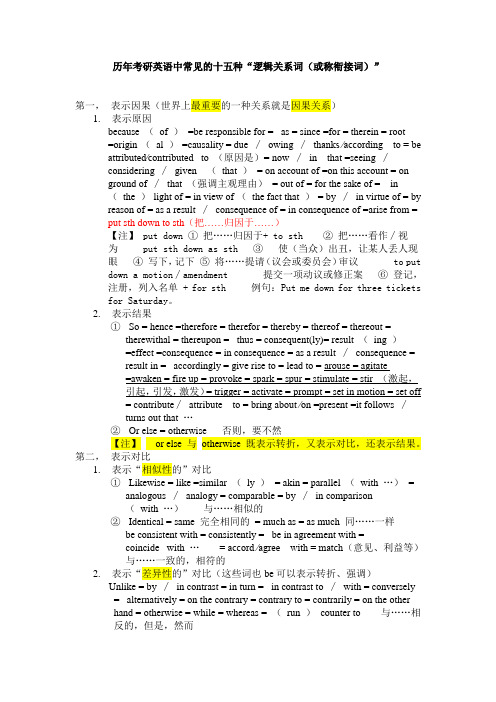
历年考研英语中常见的十五种“逻辑关系词(或称衔接词)”第一,表示因果(世界上最重要的一种关系就是因果关系)1.表示原因because (of)=be responsible for = as = since =for = therein = root=origin(al)=causality = due∕owing∕thanks ∕according to = beattributed∕contributed to (原因是)= now∕in that =seeing∕considering∕given (that)= on account of =on this account = onground of∕that(强调主观理由)= out of = for the sake of = in(the)light of = in view of (the fact that)= by∕in virtue of = byreason of = as a result∕consequence of = in consequence of =arise from =put sth down to sth(把……归因于……)【注】put down ① 把……归因于+ to sth ② 把……看作∕视为 put sth down as sth ③使(当众)出丑,让某人丢人现眼④ 写下,记下⑤ 将……提请(议会或委员会)审议 to put down a motion∕amendment提交一项动议或修正案⑥ 登记,注册,列入名单 + for sth 例句:Put me down for three tickets for Saturday。
2.表示结果①So = hence =therefore = therefor = thereby = thereof = thereout =therewithal = thereupon = thus = consequent(ly)= result (ing)=effect =consequence = in consequence = as a result∕consequence =result in = accordingly = give rise to = lead to = arouse = agitate=awaken = fire up = provoke = spark = spur = stimulate = stir (激起,引起,引发,激发)= trigger = activate = prompt = set in motion = set off= contribute∕attribute to = bring about ∕on =present =it follows∕turns out that…②Or else = otherwise 否则,要不然【注】or else与otherwise既表示转折,又表示对比,还表示结果。
表原因的介词总结

表原因的介词总结表原因或理由的介词:for, at, from, of, with, by, because of1. for 表示原因,与sorry, famous, punish, praise, thank, blame连用。
I am sorry for what I said to you. 我后悔不该对你讲那些话。
2. at 指情感变化的原因,意为“因听到或看到而……”。
He was surprised at the news. 听到这消息他大吃一惊。
3. from 指“外在的原因”,如受伤、车祸等。
He died from the wound. 他因受伤而致死。
4. of 指“内在的原因”,如病、饿等。
The old man died of hunger. 老人死于饥饿。
5. with 指生理上或情感上的由外界到内心的原因。
Hearing the news, he jumped with joy. 他们听到这个消息,欣喜若狂。
He was shaking with anger. 他气得浑身发抖。
6. by 表示外部的,尤其是暴力的或无意中造成某种结果的原因。
Her body was bent by age. 他因年老背弯了。
She took your umbrella by mistake. 我因弄错拿了你的雨伞。
7. because of 表示引起结果的直接原因。
He retired last month because of illness/because he ill.8. owing to 多表示引起某不良后果的原因。
Owing to the rain they could not come. 由于下雨他们没来。
9. thanks to 表示引起某种幸运结果的原因,常译为“幸亏……,多亏……”。
Thanks to John, we won the game. 多亏约翰,我们才赢了这场比赛。
原因的多种英语表达
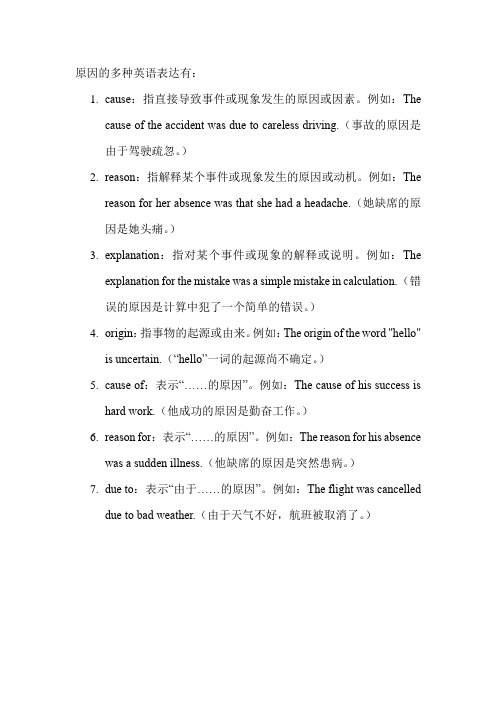
原因的多种英语表达有:1.cause:指直接导致事件或现象发生的原因或因素。
例如:Thecause of the accident was due to careless driving.(事故的原因是由于驾驶疏忽。
)2.reason:指解释某个事件或现象发生的原因或动机。
例如:Thereason for her absence was that she had a headache.(她缺席的原因是她头痛。
)3.explanation:指对某个事件或现象的解释或说明。
例如:Theexplanation for the mistake was a simple mistake in calculation.(错误的原因是计算中犯了一个简单的错误。
)4.origin:指事物的起源或由来。
例如:The origin of the word "hello"is uncertain.(“hello”一词的起源尚不确定。
)5.cause of:表示“……的原因”。
例如:The cause of his success ishard work.(他成功的原因是勤奋工作。
)6.reason for:表示“……的原因”。
例如:The reason for his absencewas a sudden illness.(他缺席的原因是突然患病。
)7.due to:表示“由于……的原因”。
例如:The flight was cancelleddue to bad weather.(由于天气不好,航班被取消了。
)。
英语中原因表示法种种
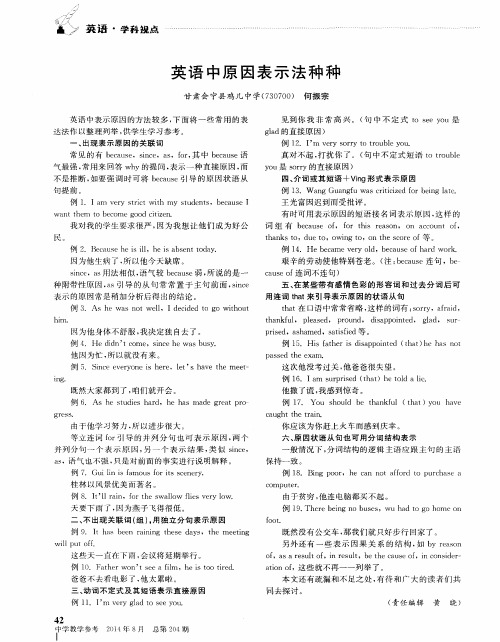
例3 .As h e wa s n o t we l l ,I d e c i d e d t o g o wi t h o u t
h i m.
艰 辛的劳动使他 特别苍 老。( 注: b e c a u s e 连句, b e c a u s e o f 连词不连句 )
p a s s e d t h e e x a m.
他 因 为忙 , 所 以就 没 有 来 。
例 5 .S i n c e e v e r y o n e i s h e r e ,l e t ’ S h a v e t h e me e t —
l l " l g・
wa n t t h e m t O b e c o me g o o d c i t i z e n .
真对不起 , 打扰你 了 。( 句 中不定式 短语 t o t r o u b l e y o u 是 s o r r y 的直接 原因)
四、 介 词 或 其 短 语 +V i n g 形式表示原 因 例 1 3 .W a n g G u a n g f u wa s c r i t i c i z e d f o r b e i n g l a t e .
英 语 ・学科 视点
英 语 中 原 因 表 示 法 种 种
甘 肃会 宁县 鸡儿 中学( 7 3 0 7 0 0 ) 何振 宗
英语 中表示原 因的方法较 多 , 下面将 一些 常用的表
达 法 作 以整 理 列 举 , 供 学 生 学 习参 考 。
一
见到你 我 非 常 高 兴 。( 句 中不 定 式 t o s e e y o u是 g l a d 的直接原 因)
表示原因的英语连接词

表示原因的英语连接词在英语写作中,为了准确地表达原因,我们需要使用一些连接词。
下面是一些表示原因的英语连接词和它们的用法:1. Because:用于在主句和从句之间表示因果关系。
例如:I couldn't sleep because my neighbor was playing loud music.2. Since:用于表示一个已知的原因。
例如:Since it was raining, we decided to stay at home.3. As:用于表示一个原因和结果之间的关系。
例如:As I was running late, I missed the train.4. Due to:用于表示一种因果关系。
例如:The flight was delayed due to bad weather.5. Owing to:用于表示一个原因和结果之间的关系。
例如:Owing to his hard work, he got promoted.6. Thanks to:用于表示一个积极的原因。
例如:Thanks to her help, I finished the project on time.7. On account of:用于表示一个原因和结果之间的关系。
例如:On account of his illness, he couldn't attend the meeting.8. Therefore:用于表示一个逻辑上的因果关系。
例如:He didn't study, therefore he failed the exam.这些英语连接词可以帮助我们更好地表达原因和结果之间的关系,使我们的写作更加清晰和准确。
- 1 -。
原因结果的英语表达方式

原因结果的英语表达方式原因结果的英语表达方式在英语中,有些词或短语用来表示某事发生的`原因,理由或心理动机。
一般情况下,表达这种因果关系,常用介词,词组及连词。
下面是店铺精心整理的原因结果的英语表达方式,欢迎大家分享。
雅思日积月累:原因结果表达方式1。
Thephenomenonmainlystemsfromthefactthat…2。
原因accountsmainlyfor/areaccountablefor 结果3。
原因 beresponsiblefor结果4。
原因contributespartlyto 结果5。
原因 bethemain/majorfactor/reason/cause6。
Anotherbasic/primary/rootreason/causewhy…isthat7。
原因cause/leadto/trigger/bringabout/resultin/giveriseto/generate 结果8。
结果isdueto 原因9。
结果beinpart/partlyattributedto 原因10。
beasecondreason/factor;beregardedas/seenasarootcause11。
dueto,owingto,becauseof…12。
…bethecauseof…/…bethereasonfor…/…bethereasonbehi nd13。
…becausedby/resultfrom/betheresultof/betheconseque nceof14。
…affect/influenceinanegativeway…15。
…canbeharmful/helpfulto…【原因结果的英语表达方式】。
英语中表示原因的几种方式

英语中表示原因的几种方式-CAL-FENGHAI.-(YICAI)-Company One1英语中表示原因的几种方式玉门油田外国语高级中学刘发强 735019英语是词汇量非常丰富的语言之一,一般通过其丰富的词汇表达丰富的思想,在表示原因的方式上,主要有以下几种:一从属连词because/ as /since /和并列连词for.如:I did it because they asked me to do it. 我做了这件事是因为他们请我做的。
As it was raining ,you’d better take a taxi .天在下雨,你最好乘出租车去。
Since we have no money ,we can’t buy it. 我们没有钱,所以我们没法买。
I asked her to stay to tea, for I had something to tell her .我请她留下来喝茶,因为我有点事要告诉她。
解析:1.这四词语气逐级递减。
2.because 表示直接的原因或理由,重点在从句,常译为“因为”;since 表示对方已知,无需说明的既成事实,中心句在主句,常译为“既然”;as 表示明显的原因,重点在主句,常译为“由于”;for是个并列连词,只能放在另一个并列句后面,表示一种推理或解释,或用作附加说明,并不指理由或原因,一般不放在句首,常译为“因为”,“其理由是”(for表示因果关系时可以同because交替使用,但for前须用逗号,而because则不必。
二介词和介词短语1. 介词with/for/at/of/from/over 这类介词所表达的原因是暗含的,汉译时不一定译出。
如:She was shivering with cold .她冷得发抖。
He was very angry at losing it . 他把它丢了,很生气。
We jumped for joy. 我们高兴得跳了起来。
due to的用法 2
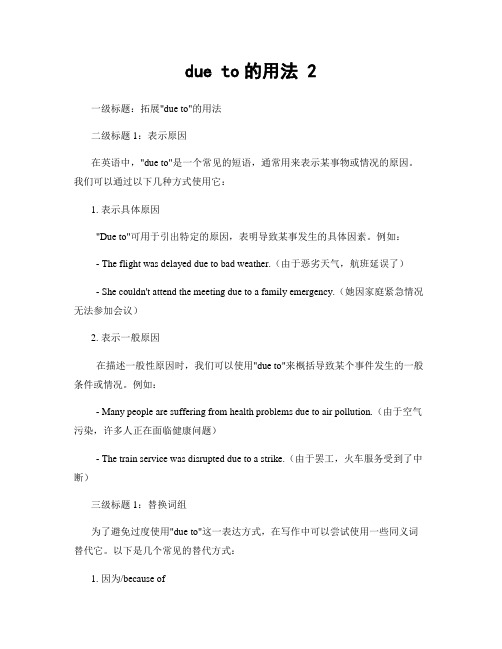
due to的用法 2一级标题:拓展"due to"的用法二级标题1:表示原因在英语中,"due to"是一个常见的短语,通常用来表示某事物或情况的原因。
我们可以通过以下几种方式使用它:1. 表示具体原因"Due to"可用于引出特定的原因,表明导致某事发生的具体因素。
例如:- The flight was delayed due to bad weather.(由于恶劣天气,航班延误了)- She couldn't attend the meeting due to a family emergency.(她因家庭紧急情况无法参加会议)2. 表示一般原因在描述一般性原因时,我们可以使用"due to"来概括导致某个事件发生的一般条件或情况。
例如:- Many people are suffering from health problems due to air pollution.(由于空气污染,许多人正在面临健康问题)- The train service was disrupted due to a strike.(由于罢工,火车服务受到了中断)三级标题1:替换词组为了避免过度使用"due to"这一表达方式,在写作中可以尝试使用一些同义词替代它。
以下是几个常见的替代方式:1. 因为/because of"Because of"是和"due to"非常相似的短语,都可以表示因果关系。
例如:- The game was canceled because of the heavy rain.(由于大雨,比赛被取消了)2. 通过/through"Through"通常表示某个行动或手段导致的结果。
例如:- She achieved success through hard work and dedication.(她通过努力工作和奉献获得了成功)3. 缘故/reason"Reason"是一个更加正式的表达方式,可用于指代具体的原因。
- 1、下载文档前请自行甄别文档内容的完整性,平台不提供额外的编辑、内容补充、找答案等附加服务。
- 2、"仅部分预览"的文档,不可在线预览部分如存在完整性等问题,可反馈申请退款(可完整预览的文档不适用该条件!)。
- 3、如文档侵犯您的权益,请联系客服反馈,我们会尽快为您处理(人工客服工作时间:9:00-18:30)。
英语中表示原因的几种
方式
文件编码(TTU-UITID-GGBKT-POIU-WUUI-0089)
英语中表示原因的几种方式
玉门油田外国语高级中学刘发强 735019
英语是词汇量非常丰富的语言之一,一般通过其丰富的词汇表达丰富的思想,在表示原因的方式上,主要有以下几种:
一从属连词because/ as /since /和并列连词for.如:
I did it because they asked me to do it. 我做了这件事是因为他们请我做的。
As it was raining ,you’d better take a taxi .天在下雨,你最好乘出租车去。
Since we have no money ,we can’t buy it. 我们没有钱,所以我们没法买。
I asked her to stay to tea, for I had something to tell her .我请她留下来喝茶,因为我有点事要告诉她。
解析:1.这四词语气逐级递减。
2.because 表示直接的原因或理由,重点在从句,常译为“因为”;since 表示对方已知,无需说明的既成事实,中心句在主句,常译为“既然”;as 表示明显的原因,重点在主句,常译为“由于”;for是个并列连词,只能放在另一个并列句后面,表示一种推理或解释,或用作附加说明,并不指
理由或原因,一般不放在句首,常译为“因为”,“其理由是”(for表示因果关系时可以同because交替使用,但for前须用逗号,而because则不必。
二介词和介词短语
1. 介词with/for/at/of/from/over 这类介词所表达的原因是暗含的,汉译时不一定译出。
如:
She was shivering with cold .她冷得发抖。
He was very angry at losing it . 他把它丢了,很生气。
We jumped for joy. 我们高兴得跳了起来。
She couldn’t speak for laughing .她笑得说不成话。
He came of his own accord. 他是自愿来的。
Many old people died from the smog. 许多老人死于烟雾污染。
It is no use crying over spilt milk .覆水难收。
2. 介词短语:英语中有大量的介词短语表示原因,以下是一些常见的例子:
on account of something/on this/that account
We delayed our departure on account of the bad weather .因为天气恶劣,我们推迟了行程。
because of
They are her because of us. 他们到这儿来是因为有我们。
by reason of
He was excused by reason of his age .他因为年龄关系而被原谅。
as a result of
The flight was delayed as a result of fog..航班因雾而晚点。
for fear of
They are afraid to speak for fear of making errors.
他们不敢讲话是因为害怕出错。
三分词(形容词,副词)+as 从句或分词结构直接作原因状语如:
Tired as he was ,we decided not to disturb him.
因为他累了,我们决定不去打扰他。
Hard as he studied, he passed the test with ease .
由于学习刻苦,他很容易地通过了测试。
Being ill,she didn’t go to school. 由于有病,她没去上学。
Having worked among the peasants for many years, he
know them well . 由于在农民中工作多年,他对他们很了解。
Led by the party, we are marching from victory to victory .在党的领导下,我们正从一个胜利走向另一个胜利。
注意:不要把第1,2 两个例子的句式与让步状语从句相混淆。
如果把这两个句子中的形容词或副词移到分词之后,就很容易看出他们表示原因,而让步状语从句中的形容词或副词移至分词末尾时则句意不合逻辑。
四动词不定式(一般放在谓语动词之后)如:
The old workers shudder to think of his miserable life in pre-liberation days .
老工人们一想到解放前的悲惨生活就不寒而栗。
I am sorry to hear that. 到这个我很伤心。
五非限定性定语从句如:
They both went softly into the bedroom, where the baby was sleeping in a cradle .
他们两个轻手轻脚地走进卧室,因为孩子正在那儿的摇篮中熟睡。
The old couple was proud of their grandson, who won 3 medals at the 27th Olympic Games .
老俩口为孙子感到骄傲,因为他在第26届奥运会上获得三枚奖
牌。
赠送常用精致线性可编辑小图标。
